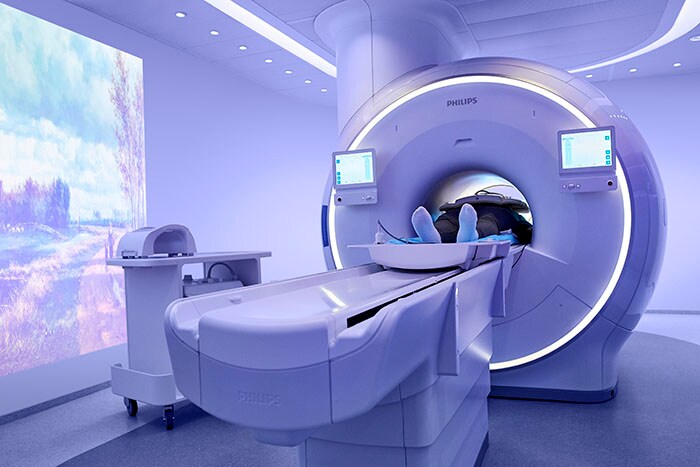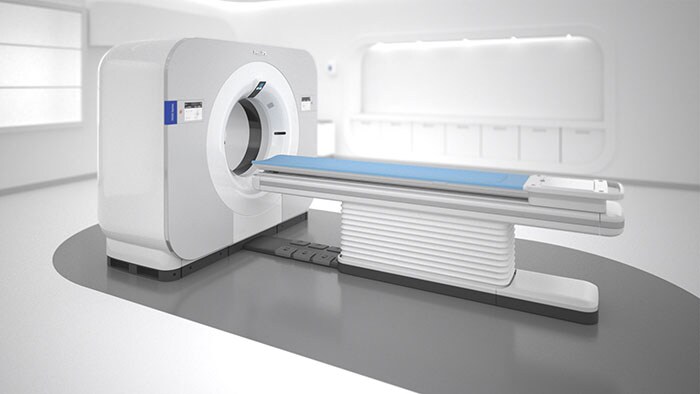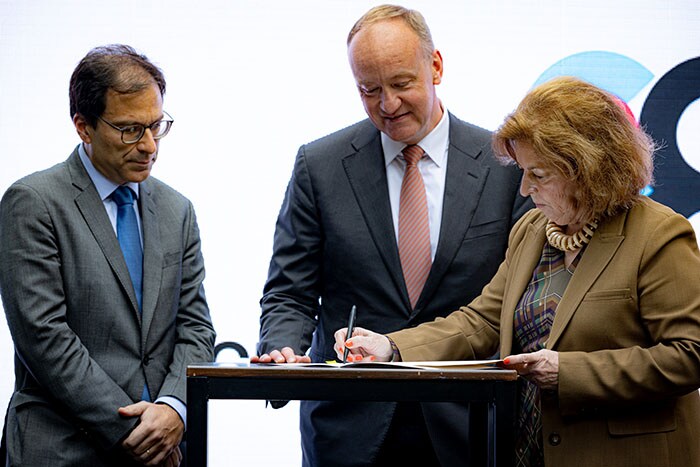Mar 15, 2023
Champalimaud Foundation partners with Philips to reduce its diagnostic imaging carbon footprint by 50% in five years
Lisbon, Portugal and Amsterdam, the Netherlands – Royal Philips (NYSE: PHG, AEX: PHIA), a global leader in health technology, and leading Portuguese translational biomedical research and clinical care provider Champalimaud Foundation, today announced they have signed a strategic partnership aimed at halving the carbon footprint resulting from Champalimaud’s use of diagnostic and interventional imaging equipment by 2028.
The transformation of Champalimaud Foundation’s imaging technology infrastructure will be enabled by a set of practical, scalable measures and innovations, including equipment upgrades, lifetime extensions, process digitalization, circular financing solutions with takeback, and renewable electricity sourcing. It will help drive the quality and efficiency of care delivery, while also realizing more sustainable healthcare. As a result, many more patients are expected to be able to benefit from the hospital’s diagnostic healthcare services.
Global healthcare systems account for 4.4% of global CO₂ emissions [1] – more than aviation or the shipping industry [2]. The cooperation between Champalimaud Foundation and Philips is based on a shared commitment to help mitigate climate change – building on Philips’ acknowledged expertise as a health technology company that is driving systemic change towards more sustainable and equitable patient care through the application of EcoDesign (embedding sustainability into the innovation process), circular economy principles, renewable energy sourcing, and workflow improvement through digitalization.
After conducting a baseline assessment of Champalimaud Foundation’s current CO₂ emissions, Philips will work with the organization to update and renew its diagnostic imaging technology capabilities, keeping it up-to-date with Philips’ latest innovations in diagnostic imaging such as CT and MR systems, while also reducing resource demand, increasing the use of recycled materials, and extending equipment lifespans. As a result, Champalimaud Foundation’s patients and staff will be able to enjoy the outcome benefits of advanced diagnostic imaging coupled with improved patient and staff experiences and more sustainable healthcare delivery.
This partnership will allow us to continue to ensure the best care for our patients while at the same time helping to reduce the healthcare sector’s environmental impact.
Leonor Beleza
President of the Champalimaud Foundation
“The healthcare sector is a significant contributor to CO₂ emissions and therefore has an important role to play in mitigating climate change,” said Leonor Beleza, President of the Champalimaud Foundation. “This partnership will allow us to continue to ensure the best care for our patients while at the same time helping to reduce the healthcare sector’s environmental impact.”
“Alongside improving patient outcomes and increasing efficiency, healthcare providers are increasingly focusing on mitigating their impact on the climate and making more sustainable choices,” said Peter Vullinghs, Market Leader Western Europe for Philips. “We have a strong track record in embedding sustainability in our solutions, our operations, and across our supply chain. Leveraging that deep expertise, we are partnering with the Champalimaud Foundation to make a step-change in their environmental impact, while enabling them to pursue their goal of advancing the prevention, early diagnosis and treatment of cancer.”
Philips will support Champalimaud Foundation’s sustainability targets through a range of health technologies and innovations designed to reduce the foundation’s dependency on natural resources and energy consumption. This includes the installation of Philips Spectral CT 7500 which uses 62.5% less energy [3]. The installation of Philips’ MR helium-free operations’ system, Philips MR – Ingenia Ambition 1.5T that uses a breakthrough design where the magnetic components are completely sealed and only need seven liters of helium over its lifetime compared to roughly 1,500 liters with other Philips’s systems. Additionally, with Philips MR SmartSpeed, the Ingenia Ambition 1.5T uses up to 53% less power per patient scan [4].
Philips will also take back the currently-installed Philips equipment and ensure responsible end-of-use management, to avoid waste going to landfill. In addition, Philips will help the Champalimaud Foundation implement hybrid operating room solutions, providing its specialists with a wide range of image-guided minimally-invasive interventional procedures with enhanced precision and patient safety, resulting in shorter hospitalization compared to traditional surgical interventions.
[1] Health Care Without Harm (2019). Health care’s climate footprint: How the health sector contributes to the global climate crisis and opportunities for action (p.22). https://noharm-global.org/documents/health-care-climatefootprint-report Scope 1 direct emissions originate from the hospitals’ own operations: emissions from the building and transportation. Scope 2 indirect emissions are generated by the production and distribution of energy that is consumed by the hospital. Scope 3 are indirect CO2 emissions caused by the production and transportation of goods and services needed by hospitals such as medicines, food, equipment, clothing and waste treatment.
[2] https://www.bmj.com/content/366/bmj.l5560
[3] When compared to an equivalent CT model of one of the industry leaders
[4] Applicable to Ambition S. Philips SmartSpeed power consumption versus Philips SENSE based scanning. Based on COCIR and in-house simulated environment. Results can vary based on site conditions.
About Royal Philips
Royal Philips (NYSE: PHG, AEX: PHIA) is a leading health technology company focused on improving people's health and well-being through meaningful innovation. Philips’ patient- and people-centric innovation leverages advanced technology and deep clinical and consumer insights to deliver personal health solutions for consumers and professional health solutions for healthcare providers and their patients in the hospital and the home. Headquartered in the Netherlands, the company is a leader in diagnostic imaging, ultrasound, image-guided therapy, monitoring and enterprise informatics, as well as in personal health. Philips generated 2022 sales of EUR 17.8 billion and employs approximately 77,000 employees with sales and services in more than 100 countries. News about Philips can be found at www.philips.com/newscenter.
About Champalimaud Foundation
The Champalimaud Foundation was created in 2004 by the last will and testament of the Portuguese entrepreneur António Champalimaud. It is one of the largest European foundations dedicated to scientific research in the field of Medicine. The Champalimaud Foundation essentially supports research in neurosciences, cancer and vision.
The mission of the Champalimaud Clinical Center (CCC) is to actively develop advanced research and technological innovation programs, alongside the interdisciplinary delivery of clinical care in the prevention, early diagnosis and treatment of cancer. Its clinical activity is patient-centered, through the personalization of care and promotion of quality of life, providing excellence in care, based on multidisciplinary teams, and providing patients with the opportunity to participate in innovative diagnostic and treatment programs.
Topics
Contacts

Joost Maltha
Philips Global Press Office Tel: +31 6 10 55 8116
You are about to visit a Philips global content page
ContinueAfonso Vaz Pinto
Champalimaud Foundation
Tel: +34 969 658 256
Raul Araújo
Champalimaud Foundation
Tel: +34 927 414 665
Media assets
Press releases
Get our press releases by e-mail
You are about to visit a Philips global content page
Continue











